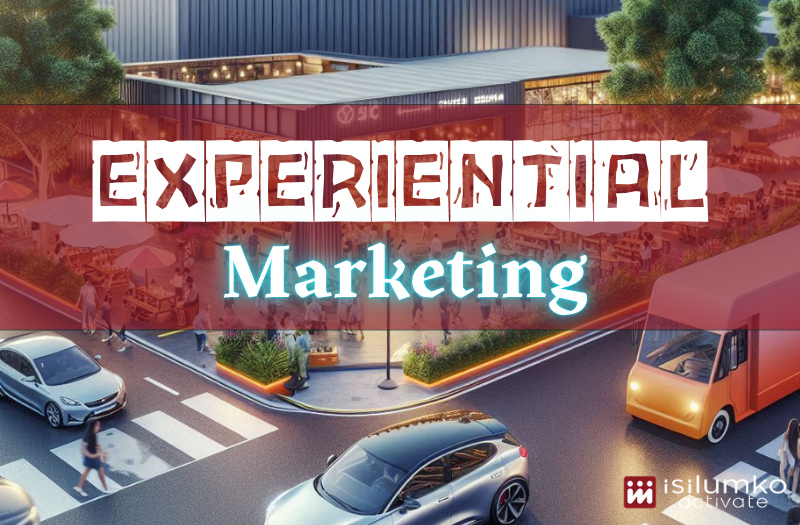“In a world where attention spans are shrinking, how can brands stand out? Enter experiential marketing—where customers don’t just see or hear a brand, they experience it.”
Experiential marketing is a marketing strategy that creates immersive and interactive experiences to engage with a target audience emotionally. Unlike traditional marketing methods, experiential campaigns focus on in-person, offline events or digital experiences that allow customers to interact with a product or service directly. These memorable experiences foster brand loyalty, increase brand awareness, and can even go viral, helping marketers build lasting connections.
In this blog, we’ll explore the meaning of experiential marketing, share examples and types of successful campaigns, and provide practical marketing ideas to inspire your next experiential marketing campaign.
Looking for top-notch experiential campaigns in Africa? Isilumko Activate can help you connect with your audience through creative brand activation strategies and live event marketing efforts. Let’s make your next experiential campaign unforgettable!
What is Experiential Marketing?
Experiential marketing goes beyond traditional marketing methods by creating interactive experiences that engage customers through senses, emotions, and physical participation. Unlike event marketing, which focuses on promoting live events, an experiential marketing campaign creates immersive moments designed to build emotional connections and foster brand loyalty.
This type of marketing focuses on delivering a unique experience that connects the target audience with a product or service in meaningful ways. Experiential marketing allows brands to tell their stories while placing consumers at the center of the experience.
Key Components
- Interactivity: Customers actively engage with the brand through in-person or offline events, like a pop-up or experiential campaign.
- Emotion: Campaigns evoke positive emotions that lead to lasting memories and customer loyalty.
- Memorability: Experiences are crafted to be likely to remember, often leveraging AR and VR technology to create virtual reality or augmented reality interactions.
Experiential marketing helps brands build brand awareness and loyalty, using creative strategies to foster word-of-mouth and deepen engagement. Experiential marketing creates lasting emotional bonds, making it a powerful way for marketers to connect with potential customers.
Why is Experiential Marketing Important?
Experiential marketing is a powerful way to capture attention in a world overwhelmed by ads. With digital experiences becoming repetitive, experiential marketing campaigns offer immersive and interactive experiences that engage the target audience in real, meaningful ways.
Memorable experiences created during an experiential campaign build strong emotional connections with consumers, fostering customer loyalty and encouraging word-of-mouth marketing. When participants feel emotionally engaged with a product or service, they’re more likely to become advocates for the brand, sharing their positive moments.
Experiential events, such as pop-ups or offline events, often lead to organic social media sharing, helping campaigns go viral and expand brand awareness. Marketers also use AR and VR technology to make these events even more interactive and in-person, giving potential customers a unique experience that leaves lasting memories.
These marketing efforts are not only about short-term buzz; they help marketers build deeper relationships that experiential marketing creates with audiences, something traditional marketing methods can’t achieve. Experiential marketing allows brands to stand out, making it essential in modern marketing strategies by encouraging both engagement and advocacy.
Successful Experiential Marketing Examples
1. Coca-Cola: Share a Coke Campaign
Coca-Cola launched a brilliant experiential marketing campaign by printing popular names on its bottles. This personalization invited customers to find bottles with their names or gift them to friends, creating memorable experiences. The campaign boosted brand awareness as people shared photos on social media, fostering a strong emotional connection with the brand.
2. IKEA: Sleepover Experience
IKEA hosted an in-person sleepover for select customers inside its showrooms. This offline event gave participants a unique experience, showcasing how IKEA products could enhance their sleep environment. It also reinforced customer loyalty by offering potential customers a fun and personal interaction with the brand.
3. Red Bull: Stratos Space Jump
Red Bull sponsored Felix Baumgartner in his daring space jump, drawing over 8 million viewers. This experiential campaign blurred the lines between marketing strategies and extreme sports, demonstrating that Red Bull truly gives wings. The event became one of the best experiential marketing campaigns, creating a lasting impact and brand loyalty worldwide.
4. Spotify: Wrapped Campaign
Spotify’s Wrapped Campaign delivered interactive digital experiences by showing users their annual music statistics. This example of experiential marketing allowed users to engage with personalized content and share their results, amplifying word-of-mouth promotion and driving brand awareness and loyalty.
Ideas for Your Own Experiential Marketing Campaigns
Idea #1: Pop-up Experiences
A pop-up shop or event creates excitement by offering exclusive products or services for a limited time. This type of experiential marketing campaign helps brands interact with the public while boosting brand awareness. Marketers can host offline events like product launches or limited-edition try-ons to engage their target audience.
Idea #2: Immersive VR/AR Experiences
Incorporate virtual reality (VR) or augmented reality (AR) to provide interactive experiences that showcase your product or service. For example, a car company can offer virtual test drives, giving potential customers a unique experience. AR and VR technology help create memorable experiences, increase brand loyalty, and drive customer engagement.
Idea #3: Brand-Hosted Workshops or Classes
An in-person workshop or class aligned with your brand creates an emotional connection with attendees. For instance, a coffee brand offering barista classes enhances customer loyalty while highlighting its premium products.
Idea #4: Gamified Experiences
Gamification taps into competitive spirit, making marketing campaigns more engaging. Fitness brands can run step challenges or scavenger hunts with prizes to go viral and attract potential customers through word-of-mouth marketing.
Idea #5: Social Impact Campaigns
Linking your experiential campaign to a cause can build lasting memories. Eco-friendly brands can sponsor community clean-ups, giving participants branded gear, driving brand awareness and loyalty, and aligning marketing with meaningful efforts.
Tips for Planning an Effective Experiential Marketing Campaign
Challenges and How to Overcome Them
Budget Constraints:
Creating a large-scale experiential marketing campaign can be costly. To manage expenses, marketers can explore cost-effective marketing strategies like online experiential marketing through interactive digital experiences or pop-ups on social media platforms. Collaborating with influencers or using marketing tools like analytics software can also help brands stretch their budgets.
Logistical Issues:
Handling logistics for offline events or live marketing can be tricky. From securing venues to managing crowd control, many challenges can arise. Working with experienced event planners or outsourcing to agencies with expertise in event marketing will ensure the smooth execution of experiential campaigns. These professionals help marketers avoid common pitfalls, ensuring everything runs seamlessly.
Risk of Negative Publicity:
A poorly executed experiential marketing campaign can backfire, causing damage to brand awareness and loyalty. Experiential marketers should develop contingency plans to address potential issues in real-time. PR teams and marketing software can monitor marketing efforts, track customer loyalty, and gather analytics to respond swiftly to negative feedback. Planning for possible risks will help create an experiential marketing strategy that is both proactive and resilient, ensuring brands create memorable experiences without hiccups.
Overcoming these challenges will lead to successful experiential marketing campaigns, stronger connections with your target audience, and increased brand awareness.
Frequently Asked Questions (FAQs)
What’s the difference between event marketing and experiential marketing?
Event marketing promotes live events, while experiential marketing campaigns create immersive experiences that build emotional connections and brand awareness through interaction.
Can small businesses afford experiential marketing?
Yes! Small businesses can run pop-ups, guerilla marketing, or offline events to create unique experiences and engage their target audience on a budget.
How can experiential marketing be integrated with online strategies?
Use VR, AR, or landing pages to connect offline events with digital experiences, tracking success through analytics and boosting marketing efforts.
Bringing it to an End
Experiential marketing is all about crafting memorable experiences that allow brands to interact with the public, creating strong emotional connections, and building lasting brand loyalty. By focusing on interactive experiences—whether through offline events, pop-ups, or AR and VR technology—this type of marketing helps brands engage their target audience meaningfully, increasing brand awareness and inspiring word-of-mouth promotion.
Now it’s your turn! Brainstorm marketing ideas and create an experiential marketing campaign tailored to your product or service. Use our marketing tools to track analytics and fine-tune your approach for successful experiential marketing campaigns.
Need expert help? Contact Isilumko Activate—we specialize in designing unique experiential marketing strategies that deliver results. Let’s create a winning experiential marketing strategy together!




